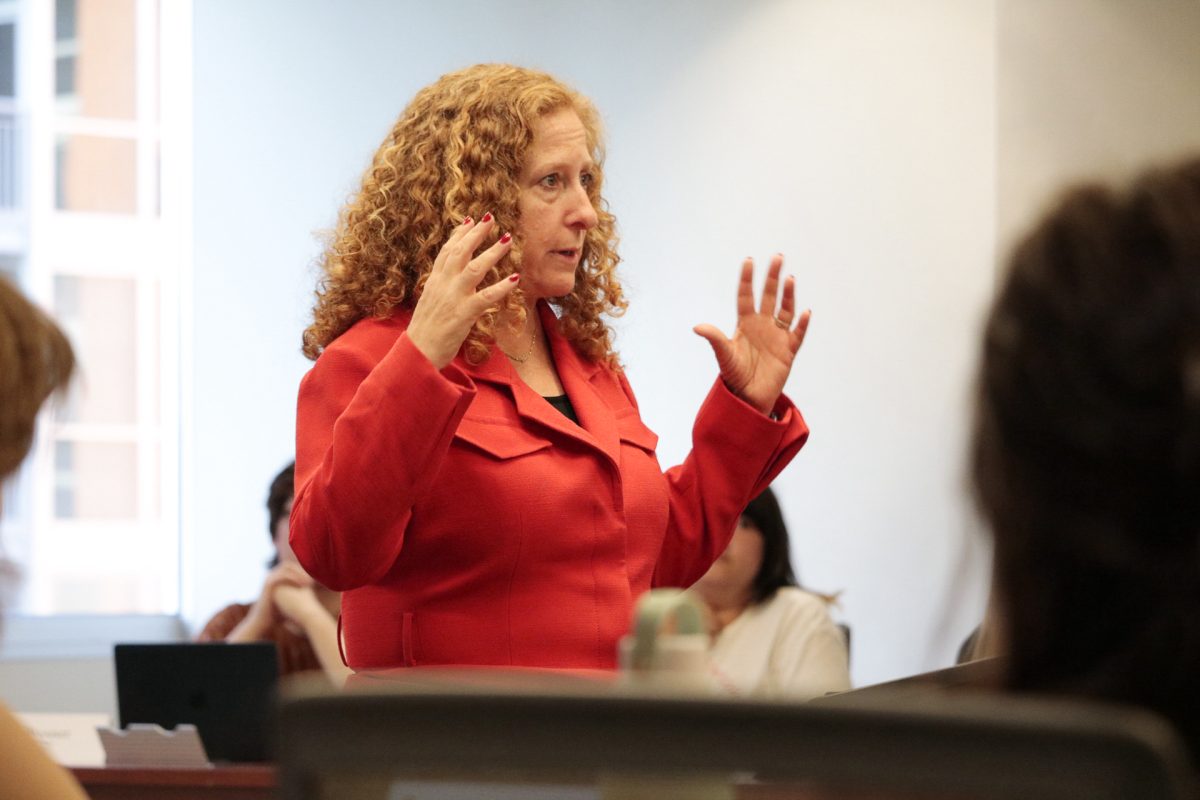When UW third-year pharmacy student
Tope Awe was arrested by United States Immigration and Customs
Enforcement late last month for failure to comply with a deportation
order, thousands joined in support trying to convince responsible
authorities to allow the student to stay in the country until her
expected graduation in May 2009.
They made posters, collected signatures
and created a Facebook group that currently has about 2,500 members,
all in efforts to avoid Awe’s imminent deportation to her
birthplace of Nigeria.
Though receiving widespread campus
support from organizations like the African Student Association, the
Campus Antiwar Network and the International Socialist Organization,
which culminated in a march to the office of U.S. Rep. Tammy Baldwin,
D-Wis., efforts to keep Awe in the country have drawn both interest
and criticism from some immigration researchers.
For Michelle Malkin, a conservative
author lecturing at UW’s Ingraham Hall Friday, the issue of
immigration is based on three principles: “Those who get in the
country get in; those who should not enter should be left out; and
those whose time has expired should be deported.”
Malkin, who has researched immigration
and focuses in deportation policies, said it took the U.S. government
until after the terrorist attacks to the World Trade Center on Sept.
11, 2001, to realize there were almost 400,000 immigrants who had
been issued deportation orders, but who had evaded the order and
disappeared.
“We had no idea who they were. We had
no idea if they had come here to do good or to do harm,” she said
during the lecture, adding deportation should be treated as not only
a priority, but a matter of national security policy.
According to the ICE spokesperson Gail
Montenegro, there currently are 580,000 immigration fugitives who
have managed to remain in the country after ordered deported.
Montenegro said the Awe family had
multiple opportunities to have their case heard in immigration court,
but their appeals had been repeatedly denied, and they were
ultimately ordered to leave the country.
According to Dave Gorak, executive
director of the Midwest Coalition to Reduce Immigration, the United
States has the most generous legal immigration policy in the world,
as the country accepts more immigrants than all of the other
countries combined.
But as a sovereign nation, Gorak added,
“We have to determine who and how many come in.”
“There’s something wrong with our
immigration policy, being the most generous in the world,” he said.
“What’s broken is the will to enforce existing laws.”
For Gorak, a credible immigration
policy is one that brings in those who deserve to come in based on
what their contribution to society is and one that also protects
American workers.
“Right now immigration represents
almost 90 percent of our nation’s growth. In the end, the more
people you have, the harder it gets to provide a stable living for
all,” he said.
Still, the United States continues to
accept record numbers of immigrants each year, along with a sizable
number of undocumented residents, most of whom have overstayed their
temporary visas.
According to Gorak, the immigration
rate, currently at 2 million per year (half of which are
undocumented) should be reduced to only 250,000 per year. For him,
there is nothing wrong with limiting the number of people coming in
the country, and that could be exemplified in a simple anecdote:
“Saying that someone in support of
limiting immigration is anti-human rights is no more than saying that
a couple who had children and don’t want any more are anti-child,”
Gorak said.
Where to draw the line
Most immigration experts, however, are
still ambivalent when asked what should be done regarding those
brought to this country at an early age –?like Awe, who came
with her parents from Nigeria at age three.
At the apex of the demonstration in
Awe’s support, some protesters said deporting her would not only
destroy her future, but her family too. For them, Tope is not
responsible for her illegal status because she was brought from her
homeland without her consent.
“Unfortunately, there are going to be
people who are caught up in this enforcement, who have very
sympathetic cases, and certainly, Tope Awe’s case is one of them,”
Malkin said. “When you have somebody who has grown up her entire
life in the United Sates, yes, it does take it to heart, and the
natural instinct would be to be outraged that our government would
send her back somewhere that’s an alien land for her.”
Another immigrant, UW freshman Ismael
Cuevas, crossed the Mexican border with his parents when he was
one-year-old, and remained undocumented until middle school. Cuevas
attended Malkin’s lecture and said he was glad to have an open
dialogue about this issue, though for him, “her logic doesn’t
make sense.”
“Many of us didn’t pick when to
come here,” he added.
UW senior John Bruning, who also
attended Malkin’s lecture, said the U.S. immigration system is “a
little ridiculous” when hopefuls have to wait years in line to be
granted rights to visit or establish residence here.
“When my family came, there was a
guarantee that you’d become an American, there was opportunity,
there was a place to stay,” Bruning said. “When they came, there
was a guarantee that you’d show up, and you’d become an
American.”
But for Gorak and Malkin, being granted
American citizenship is not a right, but a privilege –?one
that should not be taken lightly. If illegal immigrants decide to
bring their children, Gorak and Malkin added, they should be held
accountable for their well-being and any implications breaking
immigration laws would have.
“If their parents are deported, I
think it’s something that the parents need to think about, because
they are the ones who made the initial decision to bring their kids
here without their consent,” Malkin said. “It’s their decision
whether or not to break up their families.”
Gorak said the U.S. federal government
should not be responsible for “breaking families” by enforcing
immigration laws, though it is unfortunate that by being brought to
this country at an early age, Awe was caught in a situation in which
“she had no say.”
“The full responsibility for this
student’s particular situation must lie with the parents, who knew
a couple of years ago, as I understand it, that there were some
problems with their immigration status,” Gorak said.
Legalization and assimilation
According to UW history professor
Thomas Archdeacon, an immigration policy researcher, there isn’t
much provision in the law toward legalization of young immigrants,
even if they have proved their “utility” to society — Awe, for
example, has been deemed an important part of the UW community due to
her contribution founding and leading several student organizations.
“There was some effort a year or two
ago to pass in Congress a measure that would have made it possible
for people who are in the United States illegally, and who over time
did things like graduate high school or college or served in the
military, to become citizens,” Archdeacon said.
But since Congress turned down that
proposal, the law remains limited in what can be done to keep
immigrants like Awe in the country.
“But what about the people who
receive deportation orders and obey them? Whom do you reward?”
Archdeacon said. “These are policy calls, and there are always
going to be sad stories. Somebody will always have a reason why that
(law) shouldn’t apply to them, and maybe they’re right. The law,
though, is designed to deal with classes of cases rather than
individual cases.”
Yet, Archdeacon, like many others,
admits reforms will not completely solve the problems with U.S.
immigration policies.
“In any system, there will be some
injustices or there will be some people for whom the situation does
not work out well,” Archdeacon said. “There has never been a
system in any place where everyone is satisfied.”













